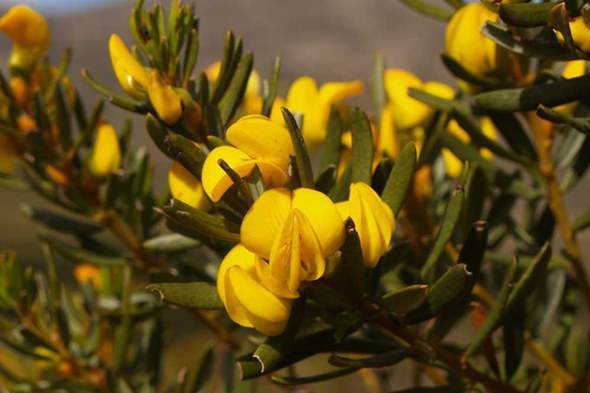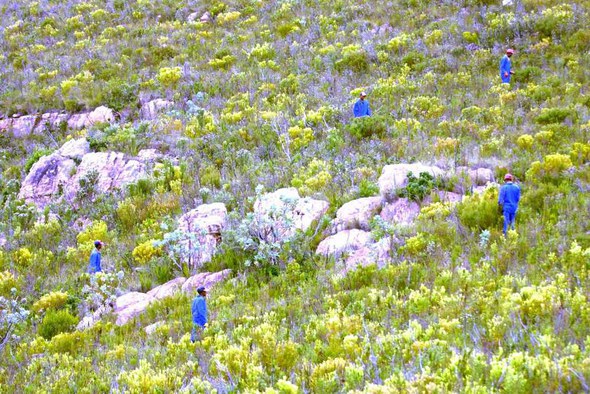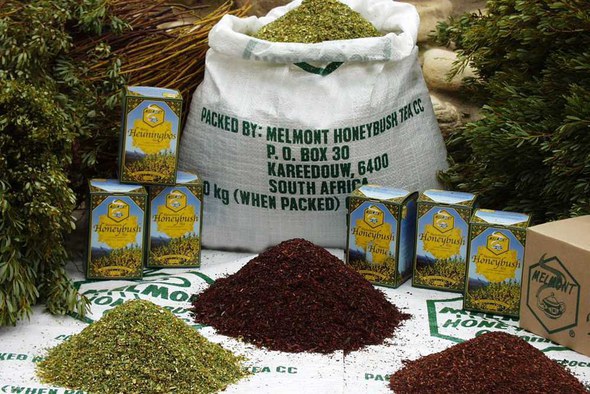HONEYBUSH (Cyclopia) Heuningbos (Afrikaans)

Discover the unique honeybush tea
Honeybush is a South African fynbos shrub that grows on the slopes of the Cape Fold Mountains. Only a few of the 23 identified Cyclopia species are used for the production of honeybush tea. The commercially used species are C. intermedia, C. genistoides, C. longifolia and C. subternata.
The earliest reference to honeybush dates back to 1705. Carl Thunberg, a Swedish botanist, documented the name "honey tea" in the 1770s. In 1815, the English missionary Christian Latrobe mentioned "tea water", presumably honeybush, which he obtained in Langkloof. C. intermedia, also known as mountain tea, accounts for about 85 % of the wild harvested crop.

Ancient traditions - modern health drink
Honeybush tea has long been used as a medicinal plant and herbal tea. Early records show that it was used for chronic catarrh and pulmonary tuberculosis. Today, honeybush tea is enjoyed for its delicious taste and aroma. It is prepared like ordinary tea, with prolonged boiling enhancing the flavor. The caffeine-free drink used to always be on hand in old farm kitchens, as it was constantly kept boiling.

Honeybush tea production process
After harvesting, the leaves and stems are cut into small pieces, moistened and fermented at 70°C for 70 hours. After fermentation, the honeybush tea is dried in the sun. This process gives the tea its characteristic sweet aroma and reddish-brown to brown color.
Green Honeybush-Tea
In 1998, Prof. Lizette Joubert produced the first batches of green honeybush tea. Green honeybush is processed without fermentation. Research focuses on the health benefits and the modification of the flavor profile of green honeybush.

Scientific research and health benefits
Research results
Research into the health benefits of honeybush tea has contributed to its international fame. Studies show that honeybush has potential to fight cancer and diabetes. The tea contains phytoestrogens and is caffeine-free. Prof. Lizette Joubert and her team have patented an anti-diabetic extract of honeybush and continue to research the health-promoting properties of the tea.

Commercialization of honeybush
Honeybush remained a small cottage industry until the mid-1990s. In 1992, Dr. Hannes de Lange started a research project on the commercial planting of Cyclopia species. The growing interest in healthy food and further research projects led to the development of the honeybush industry. In 1998, the "Melmont" brand produced the first registered organic honeybush tea.
Honeybush tea recipes

Honeybush tea classic:
Put 1 teaspoon of honeybush tea in a cup, pour boiling water over it and leave to infuse for 5-7 minutes.
Honeybush iced tea:
Steep 2 teaspoons of honeybush tea in a liter of boiling water, cool and serve with ice.
Taste and aroma
Honeybush tea is characterized by its sweet, floral aroma and mild, honey-like taste. Green honeybush offers a fruitier note and a slight sweetness.
Sustainability
Honeybush is grown and harvested sustainably to protect natural populations and the environment. Commercial plantations contribute to the conservation of Cyclopia species.




